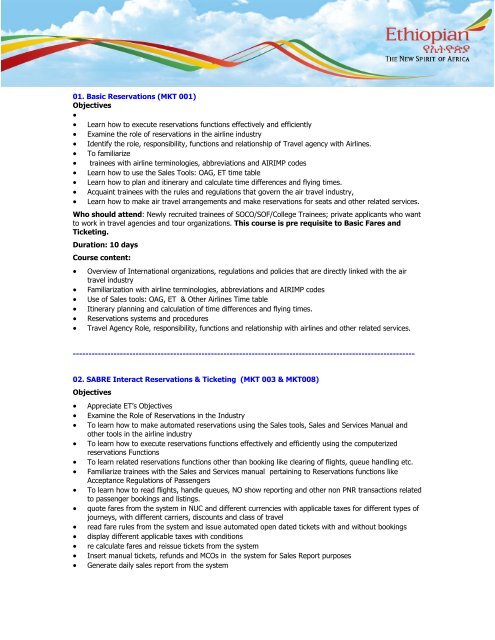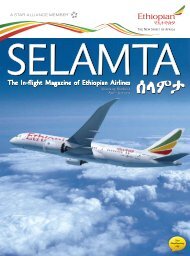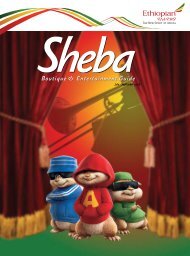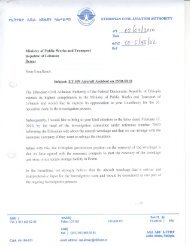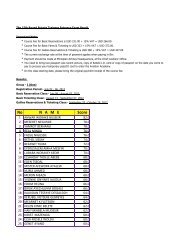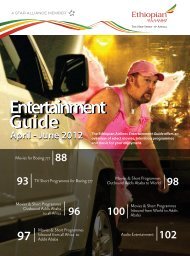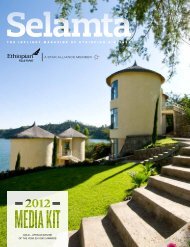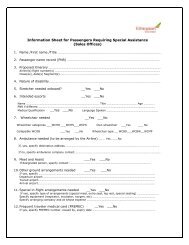COURSE OBJECTIVE AND CONTENT - Ethiopian Airlines
COURSE OBJECTIVE AND CONTENT - Ethiopian Airlines
COURSE OBJECTIVE AND CONTENT - Ethiopian Airlines
Create successful ePaper yourself
Turn your PDF publications into a flip-book with our unique Google optimized e-Paper software.
<strong>COURSE</strong> <strong>OBJECTIVE</strong> <strong>AND</strong> <strong>CONTENT</strong><br />
01. Basic Reservations (MKT 001)<br />
Objectives<br />
•<br />
• Learn how to execute reservations functions effectively and efficiently<br />
• Examine the role of reservations in the airline industry<br />
• Identify the role, responsibility, functions and relationship of Travel agency with <strong>Airlines</strong>.<br />
• To familiarize<br />
• trainees with airline terminologies, abbreviations and AIRIMP codes<br />
• Learn how to use the Sales Tools: OAG, ET time table<br />
• Learn how to plan and itinerary and calculate time differences and flying times.<br />
• Acquaint trainees with the rules and regulations that govern the air travel industry,<br />
• Learn how to make air travel arrangements and make reservations for seats and other related services.<br />
Who should attend: Newly recruited trainees of SOCO/SOF/College Trainees; private applicants who want<br />
to work in travel agencies and tour organizations. This course is pre requisite to Basic Fares and<br />
Ticketing.<br />
Duration: 10 days<br />
Course content:<br />
• Overview of International organizations, regulations and policies that are directly linked with the air<br />
travel industry<br />
• Familiarization with airline terminologies, abbreviations and AIRIMP codes<br />
• Use of Sales tools: OAG, ET & Other <strong>Airlines</strong> Time table<br />
• Itinerary planning and calculation of time differences and flying times.<br />
• Reservations systems and procedures<br />
• Travel Agency Role, responsibility, functions and relationship with airlines and other related services.<br />
-------------------------------------------------------------------------------------------------------------<br />
02. SABRE Interact Reservations & Ticketing (MKT 003 & MKT008)<br />
Objectives<br />
• Appreciate ET’s Objectives<br />
• Examine the Role of Reservations in the Industry<br />
• To learn how to make automated reservations using the Sales tools, Sales and Services Manual and<br />
other tools in the airline industry<br />
• To learn how to execute reservations functions effectively and efficiently using the computerized<br />
reservations Functions<br />
• To learn related reservations functions other than booking like clearing of flights, queue handling etc.<br />
• Familiarize trainees with the Sales and Services manual pertaining to Reservations functions like<br />
Acceptance Regulations of Passengers<br />
• To learn how to read flights, handle queues, NO show reporting and other non PNR transactions related<br />
to passenger bookings and listings.<br />
• quote fares from the system in NUC and different currencies with applicable taxes for different types of<br />
journeys, with different carriers, discounts and class of travel<br />
• read fare rules from the system and issue automated open dated tickets with and without bookings<br />
• display different applicable taxes with conditions<br />
• re calculate fares and reissue tickets from the system<br />
• Insert manual tickets, refunds and MCOs in the system for Sales Report purposes<br />
• Generate daily sales report from the system
Who should attend: Newly recruited reservations and central Reservations control agents, passenger<br />
handling agents working at Ticket and Reservations offices, Accountants working at Passenger Sales Audit<br />
and related areas. Reservations and Basic Fares and Ticketing are prerequisite to take this<br />
course.<br />
Duration: 10 working days<br />
Course Content<br />
• Implementation of the Sales & Services Manual and Sales tools in making computerized bookings<br />
• Definition, Importance of Reservations and Reservations functions<br />
• Non PNR transactions<br />
• Creation, updating and modification of the Passenger Name Record<br />
• Handling Queues, Flight Clearing, NO show reports<br />
• Itinerary Pricing<br />
• PNR Pricing Functions<br />
• Fare Construction Inputs<br />
• Fare, Rules and Tax Displays<br />
• ROE and Currency Management (Conversion Functions)<br />
• MPM/TPM Mileage displays<br />
• Electronic & paper ticket, VCR displays, VCR status identification and change, Revalidation & Reassociation<br />
• FOCUS (On-line SABRE Manual) usage for trouble shooting<br />
• Ticket Print Functions<br />
• Agent Sales Reports<br />
• Refund, exchange tickets, paper ticket surcharge, transportation voucher, miscellaneous sales, Prepaid<br />
Ticket Advise<br />
• Automated MCO, etc<br />
-------------------------------------------------------------------------------------------------------------<br />
03. Revenue Management (MKT 007)<br />
Duration: 3 days<br />
-------------------------------------------------------------------------------------------------------------<br />
04. Automated Control Functions (MKT 006)<br />
Duration: 2 days<br />
-------------------------------------------------------------------------------------------------------------<br />
05. Basic Fares & Ticketing (MKT 007)<br />
Objectives<br />
• To Acquire basic ticketing concepts and ticketing rules<br />
• To Learn currency regulation rules, IATA Geography and areas<br />
• To Use Passenger Air Tariff (PAT) books<br />
• To Calculate fares for different types of journeys<br />
• To apply basic fare construction checks in fare construction<br />
• To learn about the mileage system<br />
• To learn how to issue manual tickets and MCOs<br />
• To calculate fares for PTA transaction and send PTA messages
Who should attend: newly recruited front line staff working at Reservations and Ticket offices.<br />
Accountants working at Passenger Sales Audit and related areas; College trainees hired for Marketing and<br />
Airline staff already working on front line. Successful completion of Reservations is mandatory to<br />
pursue this course.<br />
Duration 10 days<br />
Course Content<br />
• Introduction to IATA Geography and the use of the Passenger Air Tariff<br />
• Latest Global indicators<br />
• Fare selection criteria and currency rules<br />
• Mileage system vs. lowest combination principle<br />
• Add on calculation<br />
• Higher intermediate fares check<br />
• OW/RT/CT fare construction steps and checks<br />
-------------------------------------------------------------------------------------------------------------<br />
06. SABRE Interact Reservations & Ticketing (MKT 008 & MKT003)<br />
Objectives<br />
• Appreciate ET’s Objectives<br />
• Examine the Role of Reservations in the Industry<br />
• To learn how to make automated reservations using the Sales tools, Sales and Services Manual and<br />
other tools in the airline industry<br />
• To learn how to execute reservations functions effectively and efficiently using the computerized<br />
reservations Functions<br />
• To learn related reservations functions other than booking like clearing of flights, queue handling etc.<br />
• Familiarize trainees with the Sales and Services manual pertaining to Reservations functions like<br />
Acceptance Regulations of Passengers<br />
• To learn how to read flights, handle queues, NO show reporting and other non PNR transactions related<br />
to passenger bookings and listings.<br />
• quote fares from the system in NUC and different currencies with applicable taxes for different types of<br />
journeys, with different carriers, discounts and class of travel<br />
• read fare rules from the system and issue automated open dated tickets with and without bookings<br />
• display different applicable taxes with conditions<br />
• re calculate fares and reissue tickets from the system<br />
• Insert manual tickets, refunds and MCOs in the system for Sales Report purposes<br />
• Generate daily sales report from the system<br />
Who should attend: Newly recruited reservations and central Reservations control agents, passenger<br />
handling agents working at Ticket and Reservations offices, Accountants working at Passenger Sales Audit<br />
and related areas. Reservations and Basic Fares and Ticketing are prerequisite to take this<br />
course.<br />
Duration: 10 working days<br />
Course Content<br />
• Implementation of the Sales & Services Manual and Sales tools in making computerized bookings<br />
• Definition, Importance of Reservations and Reservations functions<br />
• Non PNR transactions<br />
• Creation, updating and modification of the Passenger Name Record<br />
• Handling Queues, Flight Clearing, NO show reports<br />
• Itinerary Pricing
• PNR Pricing Functions<br />
• Fare Construction Inputs<br />
• Fare, Rules and Tax Displays<br />
• ROE and Currency Management (Conversion Functions)<br />
• MPM/TPM Mileage displays<br />
• Electronic & paper ticiket, VCR displays, VCR status identification and change, Revalidation & Re<br />
association<br />
• FOCUS (On-line SABRE Manual) usage for trouble shooting<br />
• Ticket Print Functions<br />
• Agent Sales Reports<br />
• Refund, exchange tickets, paper ticket surcharge, transportation voucher, miscellaneous sales, Prepaid<br />
Ticket Advise<br />
• Automated MCO, etc<br />
-------------------------------------------------------------------------------------------------------------<br />
07. Intermediate Fares & Ticketing (MKT 009)<br />
Objectives<br />
• To increase competency in special fare calculation and interpretation<br />
• To Learn how to calculate normal round and circle trips<br />
• To understand the relationship between normal fare construction and special fare HIP checks<br />
• Learn how to issue special fare tickets with the lowest possible fare<br />
• Learn how to collect and convert accompanying taxes, fees and charges<br />
• know how to establish related charges such as stopover/transfer fees and penalty fees for rebooking<br />
and cancellation<br />
• understand the different types of combinations such as Local combination and End-on combination<br />
Who should attend: Ticket or Travel agents who have two years work experience at ticketing,<br />
accountants working at Passenger Sales Audit. Successful completion of Basic Fares and Ticketing is<br />
mandatory Course mandatory for promotion to agent position from Junior Ticket Agent<br />
Duration 5 days<br />
Course Content<br />
• Round the world fares and other circle trips with different global indicators<br />
• Manipulating normal fare checks to obtain the lowest special fare quote<br />
• Special fare selection and analysis<br />
• Types of special fares for individual travel such as excursion fares, PEX and APEX fares<br />
• Other special fare ticketing procedures<br />
-------------------------------------------------------------------------------------------------------------<br />
08. Advanced Fares & Ticketing ((MKT 010)<br />
Objectives<br />
To learn how to:<br />
• Quote restricted and unrestricted fares for one way and return sub journeys<br />
• Calculate normal fares in NUC for one way, round trips, circle trip, round the world trip and open jaw<br />
applying multi level fares, carrier coded fares, special mileage provisions and the mileage system<br />
• Increase check rules and calculate add-on fares<br />
• Apply competitive fare calculation techniques using alternative methods like the lowest combinations<br />
principle (LCP) or slicing and dicing the itinerary
• Establish missing fares for checks purpose using the lowest combination of fares<br />
• Calculate fares for mixed class travel<br />
• Learn the endorsement procedures<br />
• Reissue tickets applying appropriate endorsement procedures and become familiar with voluntary and<br />
involuntary rerouting, issue and honor an unspecified MCO/MPD<br />
Who should attend: Ticket and Travel agents who have three years work experience in ticketing,<br />
accountants in passenger audit department. Successful completion of Intermediate Fares & Ticketing is<br />
mandatory. Course mandatory for promotion to Senior Ticket Agent from Ticket Agent position<br />
Duration 10 days<br />
Course Content<br />
• Introduction to special mileage provisions<br />
• Introduction to normal fare checks for 2 or more pricing units.<br />
• Application of the lowest combination principles<br />
• Carrier fare selection criteria<br />
• Mixed class travel<br />
• How to slice and dice journeys<br />
• Reissues and re routing<br />
• The new IATA fare calculation steps and changes<br />
• One-way, circle trip, normal fare open jaws with surface sectors<br />
-------------------------------------------------------------------------------------------------------------<br />
09. Advanced Passenger Fares & Ticketing - Refresher (MKT 010-R)<br />
Duration: 5 days<br />
-------------------------------------------------------------------------------------------------------------<br />
10. Revenue Accounting (MKT 011)<br />
Duration: 5 days<br />
-------------------------------------------------------------------------------------------------------------<br />
11. Airline Passenger Handling - Initial (MKT 013)<br />
Objectives<br />
• To understand the application of IATA standards relating to passenger and baggage handling functions<br />
• To gain a practical working knowledge of all aspects of airport passenger services functions<br />
• To develop the skills to assist passengers in professional customer focused manner.<br />
Who should attend: newly recruited reservations, ticket and passenger handling agents, newly hired staff<br />
assigned to work at the airport<br />
Duration: 5 days<br />
Course Content:<br />
• Completion, acceptance and rules relating to passenger tickets and Miscellaneous Charges Order (MCO)<br />
• Endorsement procedures, acceptance of credit cards<br />
• Baggage acceptance, tagging rules and procedures<br />
• World Tracer system for Lost and Found baggage<br />
• Ticket, travel document and other forms of fraud<br />
• Check in procedures and special passengers handling<br />
• Behavioral skills in customer service specially at check-in and gates
• Passenger expenses en-route, overbooking, delayed and denied boarding, airline liability<br />
• Loading and unloading operations<br />
• Airside safety awareness<br />
-------------------------------------------------------------------------------------------------------------<br />
12. Airline Passenger Handling - Refresher (MKT 014)<br />
Duration: 3 days<br />
-------------------------------------------------------------------------------------------------------------<br />
13. SABRE ACSI Check-in (MKT 015)<br />
Objectives<br />
• To have a clear understanding of all the basic check in entries and system response<br />
• To display or redisplay any specific requested passenger lists<br />
• To give professional passenger service while customers check in and supplement it with specific seat or<br />
special passenger handling requests.<br />
Who should attend: front line staff working at check in counter, newly recruited staff to be assigned at<br />
Reservations, Ticket offices, CRC and Reservations control staff<br />
Advantageous to have Reservations and Ticketing knowledge.<br />
Duration: 3 days<br />
Course Content:<br />
• Passenger Check in display<br />
• Check-in procedure for passenger with Electronic Ticketing<br />
• Status of a VCR, changing of status of a VCR<br />
• Automated Baggage Tag<br />
• Automated Boarding pass<br />
• Post Departure Control functions<br />
• Sorting of Standby lists<br />
• Passenger Information list<br />
• Passport Name List<br />
• Automated Excess baggage calculation<br />
-------------------------------------------------------------------------------------------------------------<br />
14. Aircraft Weight & Balance (MKT 017)<br />
Objectives<br />
• To give staff a basic knowledge of the principles of weight and balance of an aircraft<br />
• To provide load control agents and Pilots with the knowledge to appreciate the importance of weight<br />
and balance which is directly related to the safety of flights<br />
• To give more comprehensive view and understanding of what is involved in the practice of aircraft<br />
loading<br />
Duration: 5 days<br />
Who should attend: Airport staff working as Load Controllers. Airline Passenger Handling course is<br />
prerequisite. Course valid only for two years and refresher course is mandatory every two<br />
years.<br />
Course content:
• Basic principle of weight and balance<br />
• Aircraft structural load limitations<br />
• Unit Load devises<br />
• Bulk hold loading<br />
• Load Sheet<br />
• Balance tables<br />
• Loading instruction, messages<br />
• Dangerous goods<br />
• Aircraft specific instructions<br />
• Area load limitation<br />
• Loading and unloading operation<br />
• Close, compose and send Load messages (LDM, CPM, LPM) manually<br />
-------------------------------------------------------------------------------------------------------------<br />
15. Aircraft Weight & Balance for Freighter Aircrafts (MKT 017-F)<br />
Duration: 5 days<br />
-------------------------------------------------------------------------------------------------------------<br />
16. Aircraft Weight & Balance for Freighter Aircrafts - Recurrent (MKT 017-FR)<br />
Duration: 3 days<br />
-------------------------------------------------------------------------------------------------------------<br />
17. Aircraft Weight & Balance - Recurrent (MKT 017-R)<br />
Duration: 3 days<br />
-------------------------------------------------------------------------------------------------------------<br />
18. SABRE Load Manager (E-Mergo) (MKT 018)<br />
Objectives<br />
• To give the Load Control agent/supervisor a clear understanding of all the basic load control<br />
functions and entries with expected system responses<br />
• To be able to produce load planning instructions of both narrow bodied and wide bodied aircrafts<br />
and any special cargo notification for departure messages as required<br />
• To be able to close flights and make any necessary trim adjustments to produce final load sheet for<br />
on time departure<br />
• To be able to dispatch all LDP departure messages at the end of the flight<br />
• To be able to handle any late aircraft version or type changes with less disruption to passengers<br />
Who should attend: front line airport staff working as Load Controllers. Manual Aircraft weight and<br />
Balance (Course MKT 017) is pre requisite.<br />
Duration: 3 days<br />
Course content<br />
• Manual flight creation
• Flight data display<br />
• List of Active flights<br />
• Open screen display<br />
• Fuel screen<br />
• Passenger payload screens<br />
• Cargo payload and load distribution screen<br />
• Additional flight entries and information<br />
• Miscellaneous load planning entries<br />
-------------------------------------------------------------------------------------------------------------<br />
19. World Tracer (MKT 020)<br />
Objectives<br />
• To familiarize the trainees with the aspects of the World Tracer baggage management module that<br />
relate to the baggage service functions they perform on the job<br />
• To learn entries in the system describing missing, found, forwarded, damaged and pilfered<br />
baggage.<br />
• To learn how to retrieve information (file and reports) from the system<br />
• Learn how to change and add information to the system<br />
• To understand match messages and other types of displays from the system and take any<br />
necessary action<br />
• Recognize error messages and understand<br />
Who should attend: front line staff working at the airport and Lost and Found section, Customer Relations<br />
staff handling customer complaints with regards to customers luggage<br />
Duration: 5 days<br />
Course content<br />
• Creating basic files in world tracer<br />
• Displaying and amending files<br />
• Using action file transaction<br />
• Report transactions<br />
-------------------------------------------------------------------------------------------------------------<br />
20. Defensive Driving II & Ramp Safety Course (MKT 021)<br />
Objectives<br />
At the end of the course participants are expected to:<br />
• Understand definition of safety<br />
• Have the knowledge of defensive driving and ramp safety<br />
• Develop positive attitude towards preventing human as well as property damages.<br />
• Develop skill in defensive driving.<br />
• Keep work places safe<br />
Who should attend - Mandatory to all GSE operators, Ramp and cargo area workers<br />
Duration 1 day<br />
Course content<br />
• Pre –driving safety issues<br />
• Critical elements to avoid collusion<br />
• Special (weather) conditions
• Alcohol, Drugs and other medicines<br />
• Parking<br />
• Backing<br />
• Ramp safety and driving in ramp area<br />
• Loading and unloading aircraft<br />
• First Aid<br />
• Ramp fire protection and combating<br />
-------------------------------------------------------------------------------------------------------------<br />
21. Basic Cargo Skills and Procedures (MKT 022)<br />
Objectives<br />
• Gain familiarity with air cargo industry terms and expressions<br />
• Learn to control and maximize the use of the space in aircraft holds<br />
• Make fuller and more effective use of Unit Load Device<br />
• Be able to accept cargo consignment and utilize the procedures involved in handling special cargo such as human<br />
remain and live animals<br />
• Gain knowledge of an airline’s liability for the goods it carried and the correct handling of claims<br />
• Be able to understand and complete an Airway Bill to IATA standards<br />
• Apply basic rating principals and state and operator variations<br />
• Understand the principles of interline carriage<br />
Who should attend: operational staff of airlines and airlines’ handling agents, newly hired staff assigned to work at<br />
the cargo section, station managers and ground handling staff.<br />
Duration: 5 days<br />
Course content<br />
• Glossary of air cargo terms<br />
• Aircraft loading: types, holds and compartments<br />
• Unit Load Devices (ULD): types, sizes, weight, identification, acceptance standards, contours and positioning.<br />
• Aircraft loading: import/export systems, aircraft servicing, ground support equipment, loading limitations and load<br />
restraint and load spreading<br />
• Flight routings: narrow/wide-body passenger flights, dedicated cargo flights, OAG guides, loadability, timing,<br />
transfer/transit times<br />
• Acceptance of Cargo from customers, (shippers, airlines, agents) packages and documents<br />
• Special loads, including live animals, human remains, dangerous goods<br />
• Liability and handling of claims, conditions of contract<br />
• Cargo documentation, shipper’s letter of instruction, AWB completion<br />
• Basic rating system, rate structures-general cargo rates, specific commodity rates, class rates, unpublished rates,<br />
additional charges, weight and volume charges for united/non united consignments<br />
• Interline carriage-ULD Control, transfer manifest and transfer of ULD<br />
-------------------------------------------------------------------------------------------------------------<br />
22. SITA Air Cargo System (AVIVA) (MKT 023)<br />
Objectives<br />
To perform the complete functions related to the operational use of the cargo system<br />
Who should attend: Front line staff working at the cargo section handling incoming, outgoing and transit<br />
cargo, cargo marketing and cargo space control staff<br />
Basic Cargo and Procedures is prerequisite.<br />
Duration: 5 days
Course Content:<br />
• Creation of Basic booking (CAR)<br />
• Basic reservations entries<br />
• Amendments and optional fields<br />
• Lying and booked shipment list<br />
• Issuance of AWB record<br />
• Freight arrival<br />
• Creation of manifest<br />
• Group booking<br />
• Creation of mail record<br />
• ULD handling<br />
• Notification of arrival<br />
• CDR (Cargo Damage Report)<br />
• Notice of non delivery<br />
-------------------------------------------------------------------------------------------------------------<br />
23. DGR regulation (Initial) (MKT 024)<br />
Objectives<br />
• To create an awareness and recognition of undeclared Dangerous Goods<br />
• Learn how to use IATA’s Dangerous Goods Regulations manual and complete the necessary dangerous<br />
goods transport documents.<br />
• Be able to apply the regulations to identify, pack, mark, label and document dangerous goods<br />
• Develop a working knowledge of the legal responsibilities involved with the transport of dangerous<br />
goods<br />
Who should attend: Cargo acceptance and cargo agency staff, Cargo sales representatives, load planning<br />
and load control staff, operations and ground handling staff. Shippers, cargo agents, consolidators, freight<br />
forwarders and other agencies involved in processing cargo.<br />
Advantageous to have Basic Cargo and Procedures knowledge for all DGR courses. Course valid<br />
for 24 months. .<br />
Duration: 5 days<br />
Course Content:<br />
• Detailed interpretation of the current IATA Dangerous Goods Regulations Manual, Familiarization<br />
• Operator’s and shipper’s responsibilities<br />
• Classification and identification of the nine hazard classes with their main criteria, the alphabetic list and<br />
precedent of hazards table, special provisions<br />
• Packaging, marking and labeling requirements<br />
• Shipment of radioactive materials<br />
• Procedures, loading, storage and inspection, emergency procedures<br />
• Information requirements, Airway bill, shipper’s declaration for Dangerous goods and notification to<br />
Captain.<br />
-------------------------------------------------------------------------------------------------------------
24. DGR Regulation Book II (MKT 025)<br />
The Dangerous Goods Regulations has sub sections, with the same objective as the initial course but which<br />
targets different groups as follows.<br />
Who should attend: Flight crew and load planners.<br />
Duration: 3 days<br />
Content:<br />
• Gain knowledge of the current regulations and be aware of the general philosophy<br />
• Identify the classes of dangerous goods<br />
• Extract information from the list to dangerous goods<br />
• Recognize/identify the hazard/handling labels applicable to DGR<br />
• Distinguish package use and package specification<br />
• Maximize your awareness of loading restrictions and requirements<br />
• Gain knowledge of the provisions for DGR in baggage of passengers and crew.<br />
• Be familiar with emergency procedures.<br />
-------------------------------------------------------------------------------------------------------------<br />
25. Dangerous Goods Regulation—Book 3 (MKT 026)<br />
Who should attend: Cabin crew, passenger handling personnel, security screening personnel<br />
Duration: 3 days<br />
Content<br />
• Define Dangerous Goods and describe origin of current regulation<br />
• Identify classes of Dangerous goods<br />
• Be knowledgeable of the special provisions for passenger and crew<br />
• Look for un declared DGR<br />
• Recognize/identify the hazard/handling labels applicable to Dangerous goods<br />
• Be aware of the requirement to report incidents/accidents and mis-declarations involving dangerous<br />
goods<br />
-------------------------------------------------------------------------------------------------------------<br />
26. DGR Regulation – Book 4 (MKT 027)<br />
Who should attend: Ramp and warehouse personnel<br />
Duration: 3 days<br />
Course Content<br />
• Define Dangerous Goods<br />
• Describe the origin of the current regulations<br />
• Identify the classes of dangerous goods<br />
• Name the limitations for dangerous goods<br />
• Look for undeclared DGR<br />
• Recognize/identify the hazard/handling labels applicable to dangerous goods<br />
• Distinction package use and package specification markings<br />
• Recognize the need for package inspection<br />
• Apply specific storage and loading procedures for Dangerous Goods<br />
• Update pilot notification forms (NOTOC) as required<br />
• Be aware of the requirement to report incidents/accidents and mis- declarations involving<br />
dangerous goods<br />
• Apply the appropriate emergency procedure action as per emergency response matrix.
-------------------------------------------------------------------------------------------------------------<br />
27. DGR Refresher—Book 1 (MKT 028)<br />
Who should attend: Shippers, packers, Dangerous Goods acceptance personnel (Operators and Cargo<br />
Agents)<br />
Duration: 3 days<br />
Content:<br />
• Find out about the recent updates to the IATA DGR regulations<br />
• Revalidate your knowledge in accordance with the latest ICAO and IATA amendments and directives<br />
• Explore modifications instituted by other governing authorities such as the IAEA (International Atomic<br />
Energy Agency)<br />
• Review and share practical aspects of Dangerous Goods Handling<br />
-------------------------------------------------------------------------------------------------------------<br />
28. DGR—Refresher—Book 2 (MKT029)<br />
Who should attend: flight crew and load planner<br />
Duration: 2 days<br />
-------------------------------------------------------------------------------------------------------------<br />
29. DGR—Refresher Book 3 (MKT030)<br />
Who should attend: cabin crew, passenger handling and security screening personnel<br />
Duration: 3 days<br />
-------------------------------------------------------------------------------------------------------------<br />
30. DGR—Refresher Book 4 (MKT 031)<br />
Who should attend: ramp and warehouse personnel<br />
Duration: 3 days<br />
-------------------------------------------------------------------------------------------------------------<br />
31. Live animal Regulation (MKT 032)<br />
Objectives<br />
• Satisfy compliance standards and the use of IATA’s Live Animals Regulations manual<br />
• Review and discuss special routings and animal behavior<br />
• Know how to maintain the safety and welfare of animals on the ground and in the air<br />
• Learn how to assess the quantity of animals to be carried on the aircraft
• Be able to handle emergency situations<br />
• Understand container design principles for Live Animals<br />
Who should attend: Cargo acceptance staff of airlines, shippers, cargo agents, consolidators, freight<br />
forwarders and ground handling companies. Manager and supervisors involved with the transportation of<br />
Live Animals<br />
Duration: 3 days<br />
Course Content:<br />
• Proper use of IATA’s Live Regulation Manual<br />
• Government and airline regulations<br />
• Shippers and airlines responsibilities<br />
• Classification and identification of live animals<br />
• Packaging, documentation and marking requirements<br />
• Shipment of endangered species<br />
• Delay and emergency handling<br />
• Load planning and calculation<br />
• Airport and aircraft handling<br />
-------------------------------------------------------------------------------------------------------------<br />
32. Advanced Cargo Skills & Procedures (MKT 033)<br />
Objectives:<br />
• Gain greater insight into the workings of the air cargo industry sector, its regulations and acceptance<br />
limits<br />
• Be able to construct and combine unpublished cargo rates and charges familiarity with air cargo<br />
industry terms and expressions<br />
• Obtain more detailed knowledge of aircraft loading procedures and safety regulations<br />
• Learn about the dangerous goods regulations and all types of special cargo<br />
• Be able to rate all air cargo shipments, including special rates and ULD rates<br />
Who should attend: Cargo Agents, station managers and supervisors who had background experience of<br />
the air cargo industry.<br />
Participants should have successfully completed the Basic Cargo Skills and Procedures course.<br />
Duration: 10 days<br />
Objectives<br />
• To gain greater insight into the working of the air cargo industry sector, its regulations and<br />
acceptance limits<br />
• Be able to construct and combine unpublished cargo rates and charges<br />
• Obtain more detailed knowledge or aircraft loading procedures and safety regulations<br />
• Learn about DGR and all types of special cargo<br />
• Be able to rate all cargo shipments, including special rates and ULD rates<br />
Who should attend: Cargo agents, station Managers and Supervisors who had background experience of<br />
the air cargo industry<br />
Duration: 10 days<br />
Course Content:<br />
• Refer and use the TACT rules and rates manual<br />
• Maximizing space in ULD<br />
• Correct procedures for restraint and spreading of loads on ULD, handle special cargoes,<br />
AVI,HUM,DG,VAL,PER and NWP<br />
• Applying minimum charges, general cargo, specific commodity and class rated commodity correctly and<br />
effectively
• Construction and combination of rates<br />
• ULD rates and advantages of airlines bold unitzation program<br />
• Service and valuation charges, handling fees, disbursement fees and CCA fees and round off currency<br />
units<br />
• Mixed consignments and ULD rating<br />
• The Warsaw convention and conditions for carriage<br />
-------------------------------------------------------------------------------------------------------------<br />
33. Advanced Cargo Skills & Procedures - Recurrent (MKT033-R)<br />
Duration: 3 days<br />
-------------------------------------------------------------------------------------------------------------<br />
34. Ground Operations & Ramp Handling (MKT034)<br />
Objectives<br />
• To know all the functions in connection to the safe and efficient preparation of loading and unloading<br />
Who should attend: agents working at the ramp area<br />
Duration: 3 days<br />
Course content<br />
• Aircraft structural load limitations<br />
• Principles of aircraft loading<br />
• Bulk hold loading<br />
• Ramp safety<br />
• Serviceability of ULD<br />
• Movement control (aircraft movement messages, delay codes etc.)<br />
• Load messages<br />
• Consequences of load damage, and spillage, prevention and reporting<br />
• Positioning of loading and servicing equipment<br />
• Securing ULDs<br />
• Missing load procedures<br />
• GSE equipments<br />
-------------------------------------------------------------------------------------------------------------<br />
35. Automated ULD Handling (MKT 035)<br />
Objective<br />
• To accurately record the movement of all ULDs to facilitate the most efficient utilization of<br />
equipment<br />
• To learn how to update the inputs/telex detailing ULD movement<br />
Who should attend: Ramp and Cargo agents<br />
Duration: 5 days<br />
Course content<br />
• The individual ULD records
• The specific flight/date records<br />
• The relevant station inventory records<br />
• All these records can be displayed by the ACC or mechanized stations to see the latest status<br />
• Individual ULD records, displaying all movements for the last month or the last 70 movements,<br />
whichever is greater.<br />
-------------------------------------------------------------------------------------------------------------<br />
36. Occupational, Passenger & Ramp Safety Course (MKT 036)<br />
Objectives<br />
At the end of the course participants are expected to:<br />
Acquire new knowledge about Occupational, Passenger and Ramp Safety.<br />
Develop new skill in identifying sources of Accidents/Incidents & hazards that may affect<br />
employees & passengers safety & find solutions to prevent & control such sources.<br />
Develop new Attitude in communicating and co-operating with subordinates, colleagues and<br />
management in finding solutions and implementing safe environment towards employees &<br />
passengers.<br />
Duration: two days.<br />
Who should attend: mandatory for all staff working at airport, Ramp and Cargo Areas.<br />
Course Content<br />
safety management awareness<br />
Unsafe Act / human factors<br />
Safety rules and regulations<br />
Prevention strategies of accidents and incidents<br />
Selection and use of personal protection<br />
Prevention and control of workplace hazards<br />
Requirements for equipment and vehicle operation<br />
Housekeeping<br />
Passengers Safety<br />
Response to emergency situations<br />
Ramp safety & airside markings<br />
-------------------------------------------------------------------------------------------------------------<br />
37. Cargo Security (MKT 036-C)<br />
Duration: 2 days<br />
-------------------------------------------------------------------------------------------------------------<br />
38. Perishable Handling (MKT 037)<br />
Objectives<br />
• Satisfy compliance standards and the use of IATA’s Perishable Cargo Manual<br />
• Review and discuss special routings and handling of Perishable cargo<br />
• To learn the efficient handling techniques and packaging methods to ensure the delivery of<br />
perishable shipments in first class condition<br />
Who should attend: all agents working at the cargo areas, Cargo handling agents<br />
Duration: 3 days
Course Content:<br />
• Proper use of IATA’s Perishable Cargo Manual<br />
• Government and airline Regulations<br />
• Familiarization with Terms and terminologies<br />
• Shippers and <strong>Airlines</strong> Responsibilities<br />
• Packaging, documentation and marking requirements<br />
• Delay and emergency handling<br />
-------------------------------------------------------------------------------------------------------------<br />
39. Introduction to Cargo (MKT 038)<br />
Duration: 5 days<br />
-------------------------------------------------------------------------------------------------------------<br />
40. Salesmanship & Customer awareness (MKT 039-a)<br />
Objectives:<br />
To understand why people buy and why they don’t<br />
To develop the essential skills used by successful salespeople<br />
To learn to use effective questioning and listening techniques to create good relationship and<br />
influence your customers<br />
Define the features of your product and accurately match benefits to your customer’s needs<br />
Learn the skills of active listening, identify real objections and handle them professionally<br />
Recognize when and how to close a sale using different methods and give after sale service<br />
To learn different behaviors and understand ours, so that we can flex accordingly<br />
To learn how to deal professionally and confidently with customers<br />
Who should attend: Sales people, front line staff<br />
Duration: 5 days<br />
Course Content:<br />
Marketing<br />
The role of the sales person<br />
The sales cycle<br />
Communication , Listening<br />
Defining customer and Service<br />
Skills for Customer care<br />
Types of behavior<br />
-------------------------------------------------------------------------------------------------------------<br />
41. Selling Skills (MKT 039-b)<br />
-------------------------------------------------------------------------------------------------------------
42. Professional Customer Handling (MKT 040)<br />
Objectives<br />
To welcome customers professionally and create a lasting first impression<br />
To recognize your role in building and enhancing customer loyalty and meeting customer needs<br />
and exceeding expectations<br />
Achieve excellence in the service you provide to customers and maintain professionalism under<br />
pressure<br />
Communicate with customers confidently and professionally when face to face, on the telephone or<br />
in writing<br />
Handle difficult customers and complaints positively<br />
Communicate clearly and concisely with customers, build stronger relationships, listen and identify<br />
their real needs<br />
Who should attend: all staff who provide service and support to internal and external customers<br />
Duration: 3 days<br />
Course content<br />
Introduction to the course<br />
Customer care– ok to have or must have<br />
The customer first approach<br />
Creating customer loyalty<br />
Communicating positively with Customers<br />
Turning complaints into opportunities<br />
Managing Stress<br />
-------------------------------------------------------------------------------------------------------------<br />
43. Professional Telephone Handling (MKT 041)<br />
Objectives<br />
How to create a confident, personalized service on the phone<br />
Key impressions on the phone<br />
The importance of first impression<br />
Re-routing a call<br />
Projecting professionalism in words and voice<br />
Asking the right questions<br />
Listening to Customers<br />
Handling difficult customers and complaints<br />
Who should attend: front line and support staff who have a regular contact with customers on the<br />
telephone<br />
Duration: 2 days<br />
Course Content<br />
Defining service excellence<br />
Creating professional image over the telephone<br />
Effective listening and questioning<br />
Handling complaints and managing difficult situations
-------------------------------------------------------------------------------------------------------------<br />
44. Introduction to Airline (MKT 043)<br />
Objectives<br />
• To familiarize new recruits with the airline industry, regulations, organizations that govern the<br />
industry<br />
• Familiarize trainees with airline terms and terminologies<br />
• To acquaint trainees on how to use the Sales Tools, and learn to calculate time differences and<br />
flying times<br />
• To learn how to make travel arrangements<br />
Who should attend: all new recruits in the school marketing, college trainees and school of Finance<br />
Duration: one week<br />
Course content:<br />
• International Organizations- IATA, ICAO & AFRAA<br />
• Bilateral Agreements<br />
• International Flight numbering system<br />
• World Geography<br />
• Time conversion calculation<br />
• Bilateral Agreements – Freedom of the Air<br />
• International Conventions<br />
• Terms and Definitions of Travel and airline Terminologies<br />
-------------------------------------------------------------------------------------------------------------<br />
45. Recurrent Cargo Skills & Procedures (MKT 044)<br />
Objectives:-<br />
• To enrich the knowledge and skills of cargo acceptance and handling personnel.<br />
• To gain an in depth knowledge on the policies, procedures and operating practices of cargo<br />
functions and responsibilities.<br />
• To refresh various safety and security measures in cargo handling activities.<br />
• To develop utilization of cargo related IATA publications<br />
Who should attend: Cargo Agents, station managers, supervisors and personnel of ground handling<br />
companies who have background experience of the cargo industry.<br />
Participants should have successfully completed the Basic Cargo Skills and Procedures course.<br />
Duration: 3 days<br />
Course Content:<br />
• Safety and Security Measures in Cargo Operations.<br />
• Emergency Response in Cargo Operations.<br />
• Cargo and Mail Acceptance Policies, Procedures and Operating Practices.<br />
• Cargo and Mail Handling Policies, Procedures and Operating Practices.<br />
• Guidelines of Arrival and Delivery of Cargo.<br />
• Handling Mechanisms of cargo and Mail Irregularities.
-------------------------------------------------------------------------------------------------------------<br />
46. Ramp and Airside Safety (in Amharic & in English) (MKT 045)<br />
Objectives:-<br />
At the end of the course participants are expected to:<br />
• Understand definition of safety<br />
• Develop positive attitude towards preventing human as well as property damages.<br />
• Keep work places safe<br />
• Learn how to help people who involved in accident/incident<br />
Who should attend: Aircraft Loaders; cleaners, passenger assistants who work within the airport terminal<br />
and around baggage and ramp area. Refresher is mandatory every 36 months.<br />
Duration: 1 day<br />
Course Content:-<br />
• Ramp Safety;<br />
• Loading and Unloading of Aircraft;<br />
• Ergonomics<br />
• First Aid;<br />
• Ramp Fire Protection and Combating<br />
-------------------------------------------------------------------------------------------------------------<br />
47. Spoken English Class (MKT042)<br />
Objectives<br />
• Develop spoken English proficiency for front line staff<br />
• Learn how to use proper English when welcoming customers in person and over the telephone<br />
• Build participants confidence when talking and presenting in English language<br />
• Learn how to use professional English language<br />
Who should attend:- newly recruits for front line offices<br />
Duration:- 30 hours<br />
Course Content:-<br />
• Addresses different issues under which trainees will do presentations like Talking on the<br />
Telephone, Customer Handling, Complaint handling, Cultural differences<br />
• Vocabulary, Grammar, pronunciation and language check


